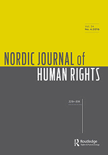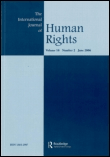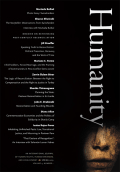
Nordic Journal of Human Rights
Scope & Guideline
Advancing Human Rights Discourse Across Disciplines
Introduction
Aims and Scopes
- Interdisciplinary Human Rights Analysis:
The journal emphasizes a comprehensive approach to human rights, integrating perspectives from law, sociology, political science, and cultural studies, thereby enriching the understanding of human rights in various contexts. - Focus on Global and Local Human Rights Issues:
It addresses both global human rights challenges and local issues, including the rights of marginalized communities, environmental justice, and socio-economic rights, highlighting the interconnectedness of these issues. - Legal Frameworks and Human Rights Implementation:
The journal explores the effectiveness of legal mechanisms and international treaties in protecting human rights, often assessing the implementation of these frameworks in various jurisdictions. - Historical and Contemporary Contextualization:
There is a consistent focus on historical perspectives in human rights studies, analyzing how past events shape current practices and ideologies around human rights. - Cultural and Ethical Dimensions of Human Rights:
The journal examines the cultural implications of human rights, considering how cultural diversity influences human rights norms and practices, and promoting a dialogue between universalism and cultural relativism.
Trending and Emerging
- Human Rights and Climate Change:
A growing body of work is addressing the intersection of human rights and environmental issues, particularly the rights of vulnerable populations affected by climate change, emphasizing the need for climate justice. - Digital Rights and Technology:
There is an increasing trend towards exploring the implications of technology and digitalization on human rights, including issues like data privacy, surveillance, and the impact of artificial intelligence. - Intersectionality in Human Rights:
Emerging papers are increasingly focusing on intersectional approaches to human rights, examining how overlapping identities (such as race, gender, and class) affect individuals' rights and experiences. - Corporate Responsibility and Human Rights Due Diligence:
There is a notable rise in discussions regarding the responsibilities of corporations in upholding human rights standards, particularly in the context of global supply chains and environmental impact. - Rights of Marginalized Groups:
The journal is increasingly publishing on the rights of specific marginalized groups, including indigenous peoples, migrants, and those affected by socio-economic inequalities, emphasizing the need for inclusive human rights frameworks.
Declining or Waning
- Traditional Notions of Human Rights:
There is a noticeable decline in articles focused solely on traditional human rights concepts without considering their intersection with contemporary issues like climate change or digital rights. - State-Centric Human Rights Approaches:
The journal has seen fewer publications emphasizing state-centric perspectives on human rights, indicating a shift towards more decentralized and community-based approaches to rights advocacy. - Narrow Legal Analyses:
There is a waning interest in articles that solely focus on legalistic interpretations of human rights without engaging with broader social, economic, and cultural implications. - Historical Human Rights Violations:
While historically significant, the frequency of publications specifically addressing past human rights violations seems to be decreasing in favor of more forward-looking analyses and solutions. - Gender Rights as a Standalone Category:
The treatment of gender rights as an isolated category appears to be declining as the journal increasingly integrates discussions of gender within broader human rights contexts.
Similar Journals

Ragion Pratica
Pioneering Ideas for a Complex WorldRagion Pratica is a distinguished academic journal that serves as a vital platform for scholarly discourse in the fields of Law, Philosophy, and Sociology and Political Science. Published by SOC ED IL MULINO in Italy, this journal aims to foster intellectual rigor and innovation by featuring research contributions that explore contemporary issues and theoretical advancements within these disciplines. With an emphasis on both empirical and theoretical research, Ragion Pratica is positioned as a Q3 journal in Law and Sociology, and Q2 in Philosophy for 2023, making it an essential resource for researchers, professionals, and students seeking to enhance their understanding of complex social dynamics. Although it operates under a traditional access model, the journal consistently attracts a diverse array of submissions that reflect the ongoing evolution of thought in these areas, ensuring its significance within the academic community. The journal's ISSN is 1720-2396, and it has been converging notable scholarship since its inception in 2016, contributing to the rich intellectual legacy of its home country.

Age of Human Rights Journal
Cultivating Critical Analyses for a Just WorldAge of Human Rights Journal, published by UNIV JAEN, SERV PUBLICACIONES, serves as a pivotal platform for scholarly discourse in the fields of Law, Political Science, and Sociology, with a specific focus on the promotion and protection of human rights. Since its establishment in 2013, this open access journal has enriched the academic community by providing a vital forum for innovative research, critical analyses, and interdisciplinary collaboration. Operating from Jaén, Spain, it maintains a commendable position within Q3 quartiles for various related categories, reflecting its growing influence and relevance, as indicated by its rankings in Scopus. The journal aims to not only disseminate knowledge but also to foster dialogues that challenge existing paradigms and advocate for the advancement of human rights globally. With continuous contributions through 2024, the Age of Human Rights Journal remains an essential resource for researchers, professionals, and students committed to understanding and improving human rights practices worldwide. Access to its comprehensive array of articles and insights is conveniently available, enhancing its role in the academic landscape.

Legal Theory
Innovating Perspectives on Law and EthicsLegal Theory, published by Cambridge University Press, stands as a significant academic journal dedicated to the exploration of the conceptual foundations and implications of law within the wider realm of philosophy. Established in 1995 and maintaining a consistent publication record through 2023, the journal has garnered a reputation for its high-quality scholarly contributions, reflected in its impressive rankings: Q2 in Law and Q1 in Philosophy as of 2023. With an impactful presence in the Scopus Ranks, Legal Theory is positioned 158th in Philosophy and 337th in Law, highlighting its relevance and influence—especially within the arts and humanities. This journal serves as a critical platform for researchers, professionals, and students who seek to engage with the intricate interplay between legal norms and philosophical inquiries. Though not open access, it offers a wealth of knowledge that is integral to advancing discourse in legal philosophy, making it an essential resource for those looking to deepen their understanding of contemporary legal theories and their implications.

Justicia
Advancing the discourse on law and justice.Justicia, a distinguished academic journal published by UNIV SIMON BOLIVAR, serves as a vital platform for the dissemination of research within the fields of law, political science, and social justice. Since its transition to Open Access in 2014, it has broadened its reach, enabling scholars, practitioners, and students from around the globe to engage with high-quality research unrestricted by subscription barriers. Located in Barranquilla, Colombia, the journal aims to foster interdisciplinary dialogue and innovation by publishing original articles, reviews, and case studies that reflect contemporary legal challenges and social issues. With its commitment to elevating discussions on justice and governance, Justicia plays a crucial role in shaping legal scholarship and influences policy-making, making it an essential resource for anyone dedicated to understanding and contributing to the field.

Washington International Law Journal
Empowering Voices in International Legal StudiesWashington International Law Journal is a distinguished publication dedicated to the field of international law, published by the University of Washington. With an ISSN of 2377-0872, this journal provides a vital platform for scholarly discourse and critical analysis on global legal issues, ranging from human rights to trade law. Although it currently does not offer open access options, the journal aims to facilitate the dissemination of pioneering research and insightful commentary from leading scholars and practitioners in the field. It holds significant value for researchers, professionals, and students seeking to deepen their understanding of international legal frameworks and their implications worldwide. The journal’s commitment to fostering academic excellence positions it as an essential resource for anyone engaged in the dynamic landscape of law on an international scale.

Onati Socio-Legal Series
Empowering voices in the socio-legal landscape since 2011.Onati Socio-Legal Series is a prominent interdisciplinary journal published by the ONATI International Institute of Sociology and Law, located in the culturally rich region of Gipuzkoa, Spain. With a commitment to open access publishing since 2011, it provides a valuable platform for researchers and practitioners in the fields of law and social sciences to share innovative scholarship, fostering a deeper understanding of the socio-legal dimensions that shape our world. Currently ranked in the Q3 quartile within both Law and Social Sciences categories, the journal serves a global readership and is indexed in Scopus, demonstrating its relevance and contribution to academic discourse. The period from 2019 to 2024 marks a pivotal phase in the journal’s evolution, aiming to address contemporary legal challenges through a socio-legal lens, making it an indispensable resource for scholars, students, and professionals alike.

International Journal of Human Rights
Advancing the Discourse on Human RightsThe International Journal of Human Rights is a prestigious academic publication focusing on critical issues within the realm of human rights, law, sociology, and political science. Published by Routledge Journals, Taylor & Francis Ltd, this journal garners a significant reputation with a 2023 impact factor ranking it in the second quartile (Q2) within both the law and sociology categories. The journal provides a vital platform for researchers and scholars to disseminate original research, theoretical discussions, and comparative studies on pressing human rights concerns globally. With an impressive standing reflected in its Scopus ranks, placing it in the 84th and 72nd percentiles for law and sociology respectively, the journal plays an essential role in advancing the discourse on human rights. While it is not an open access publication, the journal prioritizes high-quality content and rigorous peer review, ensuring that it meets the academic standards demanded by its audience of researchers, professionals, and students committed to the advancement of human rights within diverse contexts.

International Journal of Human Rights and Constitutional Studies
Bridging theory and practice in the realm of human rights.The International Journal of Human Rights and Constitutional Studies, published by INDERSCIENCE ENTERPRISES LTD, serves as a pivotal platform for disseminating scholarly research and discussions surrounding human rights and constitutional issues globally. With an ISSN of 2050-103X and E-ISSN of 2050-1048, this journal aspires to bridge theoretical frameworks and practical applications within the fields of law, political science, and public policy. Although it operates on a traditional subscription model, the journal is committed to ensuring that essential research reaches a broad audience of scholars, practitioners, and students dedicated to the protection and promotion of human rights. By providing a forum for innovative ideas and rigorous analysis, the journal plays a crucial role in advancing the understanding of constitutional rights in the context of contemporary challenges. This makes it an invaluable resource for those engaged in the ongoing discourse surrounding democracy, governance, and justice.

Humanity-An International Journal of Human Rights Humanitarianism and Development
Advancing the discourse on human rights and humanitarianism.Humanity: An International Journal of Human Rights, Humanitarianism and Development is a leading academic journal published by University of Pennsylvania Press, dedicated to the intricate intersections of human rights, humanitarian issues, and sustainable development. With its ISSN 2151-4364 and E-ISSN 2151-4372, the journal is pivotal in promoting interdisciplinary research that addresses social justice and global challenges. Operating from the heart of the United States, specifically at Journals Division, 3905 Spruce Street, Philadelphia, PA 19104, Humanity aims to foster dialogue among researchers, practitioners, and policymakers. It boasts a commendable position with Q3 rankings in the fields of Law, and Sociology and Political Science for 2023, alongside Scopus rankings that reflect its strong academic impact. While primarily subscription-based, the journal dedicates itself to producing high-quality research that resonates with contemporary issues, making it a crucial resource for researchers, professionals, and students seeking to engage with the latest developments in human rights and humanitarian discourse.

CORNELL INTERNATIONAL LAW JOURNAL
Exploring the intersection of law and international relations.CORNELL INTERNATIONAL LAW JOURNAL, published by CORNELL LAW SCHOOL, is a premier academic journal dedicated to advancing scholarship in the fields of law, political science, and international relations. Established with a commitment to fostering critical dialogue, this journal provides a platform for innovative research and legal analysis on pressing global issues. With an ISSN of 0010-8812 and an E-ISSN of 1930-7977, CORNELL INTERNATIONAL LAW JOURNAL holds a respectable Q3 ranking in the 2023 categories of Law, and Political Science and International Relations, underscoring its relevance within the academic community. The journal is indexed in Scopus, achieving a rank of #416 in Law and #345 in Political Science, illustrating its significant impact and accessibility. By providing essential insights, this journal aims to serve not only academics but also practitioners and policymakers interested in the evolving landscape of international law and governance.